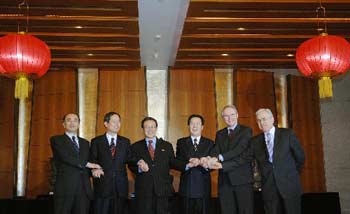
Chief negotiators to the six-party talks pose for a
picture before the closing ceremony of the talks at the Diaoyutai State
Guesthouse in Beijing on Feb. 13. Left to right: Japan's chief envoy
Kenichiro Sasae, South Korea's Chun Yung-woo, DPRK's Kim Kye Gwan, China's Chief
envoy Wu Dawei, U.S. envoy Christopher Hill and Russia's Alexander Losyukov. -
Xinhua
The six-party talks yesterday ended with a joint document on the first step
toward the denuclearization on the Korean Peninsula.
Under the document, the Democratic People's Republic of Korea (DPRK) will
shut down and seal the Yongbyon nuclear facility, including the reprocessing
facility and invite back IAEA personnel to conduct all necessary monitoring and
verifications.
The parities agreed to the provision of emergency energy assistance to the
DPRK in the initial phase, and the assistance equivalent to 50,000 tons of heavy
fuel oil will commence within 60 days, said the document.
According to the document, six parties agreed on the establishment of five
working groups on the denuclearization of the Korean Peninsula, normalization of
DPRK-U.S. relations, normalization of DPRK-Japan relations, economy and energy
cooperation as well as Northeast Asia peace and security mechanism.
The working groups will discuss and formulate specific plans for the
implementation of the Sept. 19 statement in their respective areas, it said.
The parties agreed that all working groups will meet within next 30 days.
The detailed modalities of the said assistance will be determined through
consultations and appropriate assessments in the working group on economic and
energy cooperation, it said.
Once the initial actions are implemented, the six parties will promptly hold
a ministerial meeting to confirm implementation of the joint document and
explore ways and means for promoting security cooperation in the Northeast Asia,
it said.
The parties reaffirmed that they will take positive steps to increase mutual
trust, and will make joint efforts for lasting peace and stability in Northeast
Asia. The directly related parties will negotiate a permanent peace regime on
the Korean Peninsula at an appropriate separate forum, it said.
The parties agreed to hold the sixth round of six-party talks on March 19 to
hear reports of the working groups and discuss actions for the next phase.
Top Chinese envoy to the six-party talks Wu Dawei said at the closing plenary
that the denuclearization process has stridden an "important and solid step".
The joint document is conducive to peace and stability in Northeast Asia and
to developing and improving relations between relevant countries, Wu said.
The DPRK and the United States will start bilateral talks aimed at resolving
pending bilateral issues and moving toward full diplomatic relations, the joint
document said.
The United States will begin the process of removing the designation of the
DPRK as a state-sponsor of terrorism and advance the process of terminating the
application of the Trading with the Enemy Act with respect to the DPRK, the
document said.
The DPRK and Japan will also start bilateral talks aimed at taking steps to
normalize their relations in accordance with the Pyongyang Declaration, on the
basis of the settlement of unfortunate past and the outstanding issues of
concern, according to the document.
"The six-party talks are vigorous. It is still full of hope to push and
deepen the process of the talks," Wu said.



